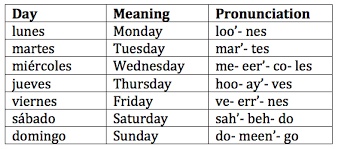Learning the days of the week in Spanish is essential. Start with ‘lunes’ for Monday and ‘domingo’ for Sunday. Practice pronouncing each day with native speakers. Everyday phrases incorporate these names naturally. Try flashcards and labeling items at home for practice. Did you know the names have interesting origins? Keep exploring for more exciting insights!
Basic Overview of Days in Spanish
In Spanish, the days of the week follow a consistent pattern that’s easy to learn. The week starts with ‘lunes’ (Monday), followed by ‘martes’ (Tuesday), ‘miércoles’ (Wednesday), ‘jueves’ (Thursday), ‘viernes’ (Friday), ‘sábado’ (Saturday), and finally ‘domingo’ (Sunday). It’s important to note that the days of the week aren’t capitalized in Spanish unless they’re at the beginning of a sentence or part of a title.
Understanding the days of the week is essential for scheduling appointments, making plans, or simply talking about the days in Spanish. As you practice using the names of the days in context, you’ll become more comfortable with incorporating them into your conversations. Remember that the days of the week are masculine in Spanish, so they’re paired with masculine articles like ‘el’ (the).
Pronunciation Tips for Days
Considering the pronunciation of the days of the week in Spanish, focus on enunciating each day with the correct accentuation to enhance your language skills.
In Spanish, each day of the week has a unique pronunciation, and mastering these can improve your fluency. For example, Monday is ‘lunes’ (loo-nes), Tuesday is ‘martes’ (mar-tes), Wednesday is ‘miércoles’ (mee-air-coles), Thursday is ‘jueves’ (hwe-ves), Friday is ‘viernes’ (bee-er-nes), Saturday is ‘sábado’ (sah-bah-do), and Sunday is ‘domingo’ (doe-meen-go).
Pay attention to the emphasis on the syllables and the correct sounds of the letters to pronounce them accurately. Practice saying the days out loud to get comfortable with the pronunciation. Listening to native speakers or using language learning resources can also help refine your pronunciation.
Common Phrases Using Days
Have you ever wondered how to incorporate the days of the week into common phrases in Spanish?
Days of the week are frequently used in expressions in Spanish, adding a dynamic element to conversations.
For example, ‘El lunes empiezo mi dieta’ translates to ‘I’m starting my diet on Monday.’ This showcases how the days are seamlessly integrated into everyday speech.
Another common phrase is ‘Los viernes son para relajarse,’ which means ‘Fridays are for relaxing.’ It demonstrates how days aren’t just part of a schedule but also convey a sense of routine or habit.
Additionally, phrases like ‘Mañana es martes’ (Tomorrow is Tuesday) or ‘El sábado pasado fuimos al cine’ (Last Saturday we went to the movies) provide context and clarity to conversations.
Practice Exercises for Memorization
Let’s dive into some effective practice exercises to help you memorize the days of the week in Spanish. One helpful method is to create flashcards with the Spanish names of the days on one side and their English translations on the other. You can quiz yourself regularly by looking at the Spanish side and trying to recall the English translation.
Another useful practice is to write out the days of the week in Spanish multiple times, reinforcing your memory through repetition.
Additionally, you could try incorporating the days of the week into your daily routine. Label items in your home with the Spanish names of the days or set reminders on your phone using Spanish. This way, you’ll see and use the words in context, making them more memorable.
Practicing with a friend or language partner can also be beneficial. Quiz each other on the days of the week in Spanish, helping each other when one gets stuck. By engaging in these various practice exercises, you’ll soon become confident in your ability to recall the days of the week in Spanish.
Fun Facts About Spanish Days
Exploring interesting tidbits about the days of the week in Spanish can add a touch of fascination to your language learning journey. Did you know that the names of the days in Spanish are mostly derived from Latin and have their roots in ancient mythology and celestial bodies?
For instance, ‘martes’ (Tuesday) comes from the Roman god of war, Mars, while ‘miércoles’ (Wednesday) is named after Mercury, the messenger god. The day ‘jueves’ (Thursday) honors Jupiter, the king of the gods in Roman mythology, and ‘viernes’ (Friday) is linked to Venus, the goddess of love.
Moreover, the Spanish names for Saturday and Sunday, ‘sábado’ and ‘domingo,’ have religious origins. ‘Sábado’ is associated with the Jewish Sabbath, while ‘domingo’ signifies the day of the Lord, referring to Sunday as a day of rest and worship. Understanding these historical and mythological connections behind the Spanish days of the week can deepen your appreciation for the language and its cultural heritage.
Frequently Asked Questions
How Do the Names of the Days in Spanish Compare to Other Romance Languages Like French or Italian?
When you compare the names of the days in Spanish with French or Italian, you’ll notice similarities due to their shared Latin roots. Despite some differences in pronunciation, many of the days have recognizable cognates across these Romance languages.
Are There Any Traditional Customs or Celebrations Associated With Specific Days of the Week in Spanish-Speaking Countries?
In Spanish-speaking countries, various traditional customs and celebrations are associated with specific days of the week. These cultural practices reflect the rich history and diverse traditions of each region, making each day unique and significant.
Do Spanish-Speaking Countries Follow the Same Weekend Structure as Many Western Countries With Saturday and Sunday Off?
Yes, Spanish-speaking countries generally follow the same weekend structure as many Western countries, with Saturday and Sunday off. This standard weekend format allows for rest, leisure activities, and time spent with family and friends.
Are There Any Superstitions or Beliefs Related to Certain Days of the Week in Spanish-Speaking Cultures?
In Spanish-speaking cultures, various superstitions and beliefs are tied to different days of the week. For example, some people avoid starting new projects on Fridays, believing it brings bad luck. These traditions are deeply rooted.
How Do Spanish-Speaking Countries Refer to Weekdays in Informal or Colloquial Language?
In informal or colloquial language, Spanish-speaking countries often refer to weekdays using shortened versions of the names. This makes communication more casual and familiar, helping you connect with locals effortlessly.
Conclusion
So, now you know the names of the days in Spanish! Practice saying them out loud and using them in common phrases to help solidify your knowledge. Remember to pay attention to pronunciation tips and keep practicing to improve.
Learning the days of the week in Spanish is a great way to expand your language skills and enhance your cultural knowledge. Keep up the good work!
¡Buena suerte! (Good luck!)


